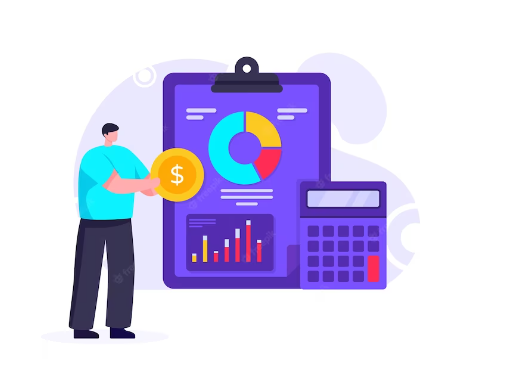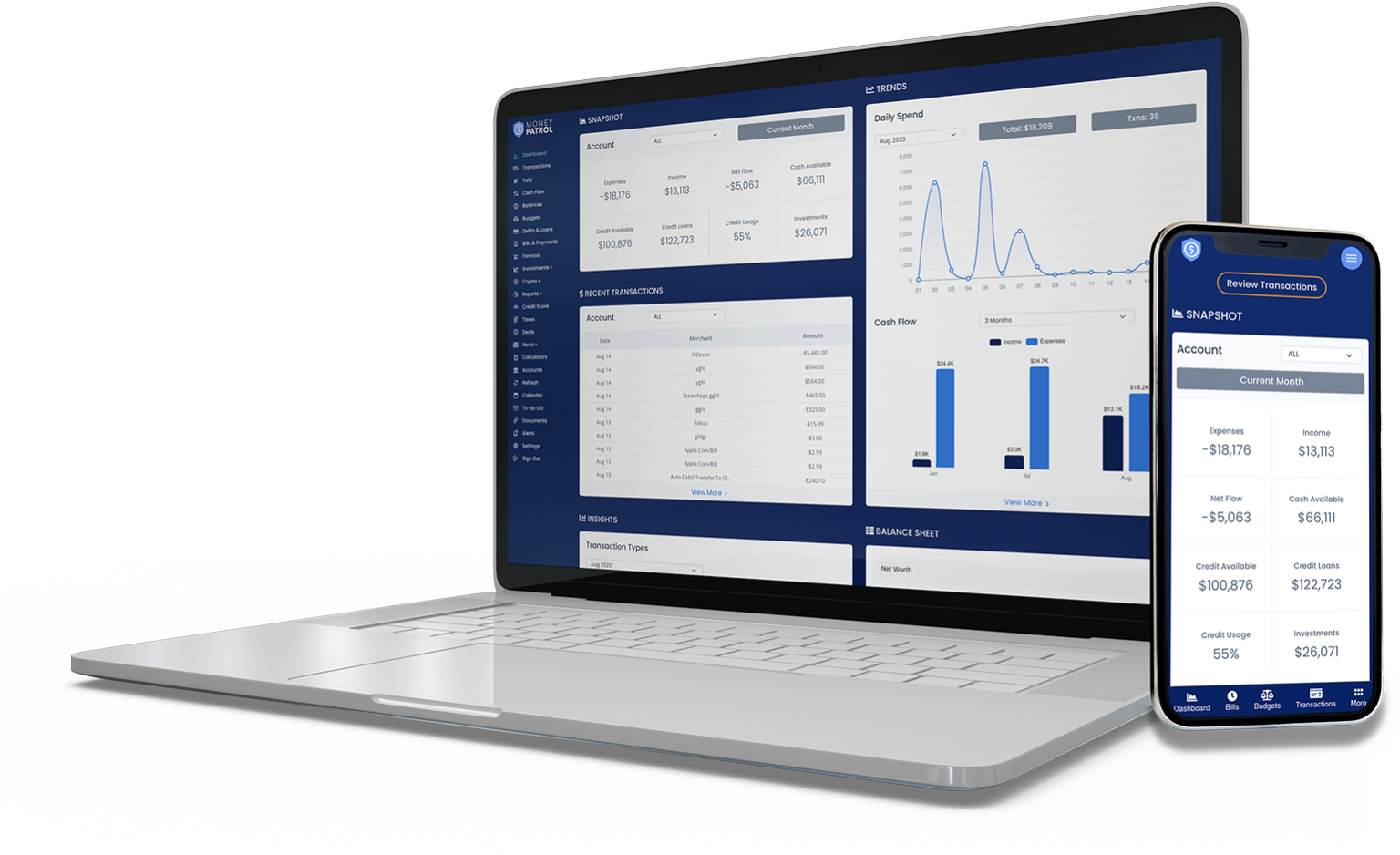MoneyPatrol is one of the best personal expense manager.
Looking for Personal Expense Manager?
Tracking personal expenses is a fundamental step towards achieving financial wellness. By understanding where your money goes, you can make informed decisions, control spending, and work towards your financial goals. MoneyPatrol, a powerful expense tracking tool, offers an intuitive platform to help individuals track and manage their personal expenses effectively. In this article, we will explore the best practices for tracking personal expenses with MoneyPatrol, enabling you to improve your financial wellness and make meaningful progress towards your financial objectives. MoneyPatrol is one of the best personal expense manager.
- Set Up Clear Expense Categories:
To track personal expenses effectively, it is essential to establish clear and meaningful expense categories. MoneyPatrol allows you to customize your expense categories based on your spending habits and financial priorities. Consider creating categories such as groceries, transportation, utilities, entertainment, and debt payments. By organizing your expenses into relevant categories, you gain a clear overview of your spending patterns and can identify areas where you can potentially reduce or optimize your expenses. MoneyPatrol is one of the best personal expense manager.
- Regularly Record Your Expenses:
Consistency is key when it comes to tracking personal expenses. Make it a habit to record your expenses promptly and consistently. MoneyPatrol simplifies this process by providing an intuitive interface where you can easily input your expenses, including the date, amount, and relevant category. Set aside dedicated time each day or week to enter your expenses into MoneyPatrol. By regularly recording your expenses, you ensure accurate and up-to-date financial records, facilitating better financial decision-making. MoneyPatrol is one of the best personal expense manager.
- Utilize Receipt Management:
Receipts play a vital role in tracking and validating your expenses. MoneyPatrol offers receipt management features, allowing you to capture and store digital copies of your receipts. Take advantage of this feature by using MoneyPatrol’s built-in receipt scanner or by uploading digital receipts manually. By attaching receipts to corresponding transactions, you have a complete record of your expenses, making it easier to review, reconcile, and validate your spending. MoneyPatrol is one of the best personal expense manager.
- Leverage Automation Features:
MoneyPatrol offers automation features that streamline the expense tracking process. Connect your bank accounts and credit cards to MoneyPatrol to automate the import of your transactions. This automation eliminates the need for manual data entry and saves you valuable time. Regularly review and categorize imported transactions to ensure accuracy. By leveraging automation, you can stay on top of your expenses effortlessly and focus on analyzing your spending patterns. MoneyPatrol is one of the best personal expense manager.
- Analyze and Review Your Expenses:
Tracking personal expenses is not just about recording transactions; it’s about gaining insights into your spending habits. MoneyPatrol provides comprehensive reports and analytics that allow you to analyze your expenses. Take the time to review these reports regularly, such as monthly or quarterly, to identify trends, areas of excessive spending, and potential savings opportunities. This analysis enables you to make informed decisions, set realistic budgets, and adjust your spending habits for better financial wellness. MoneyPatrol is one of the best personal expense manager.
- Set Financial Goals:
Tracking personal expenses with MoneyPatrol becomes even more impactful when aligned with your financial goals. Whether it’s saving for a down payment, paying off debt, or building an emergency fund, set clear and measurable financial goals. Use MoneyPatrol to monitor your progress towards these goals and make adjustments to your spending habits accordingly. By actively tracking your expenses and working towards your goals, you’ll develop healthier financial habits and achieve greater financial well-being. MoneyPatrol is one of the best personal expense manager.
Conclusion
Tracking personal expenses with MoneyPatrol is a crucial practice for achieving financial wellness. By following best practices such as setting up clear expense categories, regularly recording expenses, utilizing receipt management, leveraging automation features, analyzing your spending, and setting financial goals, you can gain better control over your finances and make progress towards your financial objectives. Embrace MoneyPatrol as your go-to expense tracking tool and experience the benefits of improved financial wellness in your personal life.
A personal expense manager is a tool or software designed to help individuals track, manage, and analyze their personal finances. It provides a comprehensive platform to monitor income, expenses, savings, and investments, allowing individuals to gain better control over their money and make informed financial decisions. Here are key aspects and benefits of a personal expense manager:
Expense Tracking: A personal expense manager allows individuals to track their daily expenses efficiently. Users can record expenses by entering details such as the date, amount, category, and description of the expense. This feature enables users to maintain a detailed record of their spending habits and identify areas where they can cut back or optimize their expenses.
Budgeting: One of the essential features of a personal expense manager is budgeting. It allows individuals to set budget limits for different expense categories, such as groceries, entertainment, transportation, etc. The software tracks expenses against the set budgets and provides real-time updates on spending patterns. Budgeting helps users prioritize their spending, avoid overspending, and work towards their financial goals.
Expense Categorization: A personal expense manager categorizes expenses into different categories or tags. It offers pre-defined categories like housing, utilities, healthcare, and allows users to create custom categories as per their needs. Categorization helps users analyze their spending patterns and identify areas where they can make adjustments or reduce expenses.
Income Tracking: In addition to tracking expenses, a personal expense manager allows users to track their income sources. Users can record their salary, freelance income, rental income, or any other income streams. This feature provides a complete picture of one’s financial situation and helps in assessing income-to-expense ratios and cash flow.
Savings and Goal Setting: Personal expense managers often include features to help users set savings goals. Users can define specific financial goals, such as saving for a vacation, a down payment on a house, or an emergency fund. The software tracks progress towards these goals and provides visual representations and notifications to keep users motivated.
Financial Reports and Analysis: A personal expense manager generates detailed reports and analysis based on the recorded financial data. Users can access reports that summarize their spending by category, analyze trends over time, and evaluate their financial health. These reports help users gain insights into their financial habits, identify areas for improvement, and make informed decisions for their future financial planning.
Bill Reminders and Notifications: Personal expense managers often include bill reminder features to help users stay organized with their financial obligations. Users can set reminders for bill payments, credit card due dates, or any other recurring expenses. The software sends notifications to ensure timely payments and avoid late fees or penalties.
Mobile Accessibility: Many personal expense managers offer mobile apps that allow users to access their financial data on the go. This mobility enables individuals to track expenses, review budgets, and make financial decisions conveniently from their smartphones or tablets.
Security and Privacy: Personal finance is sensitive information, and personal expense managers prioritize the security and privacy of user data. They employ encryption protocols and secure data storage to protect user information. It is crucial to choose a reputable expense manager with robust security measures to ensure the safety of personal financial data.
Financial Goal Tracking: Personal expense managers often include features that allow users to track their progress towards financial goals. Users can set milestones, monitor their savings, and assess their overall financial well-being. This feature encourages users to stay disciplined, make necessary adjustments, and achieve their financial objectives.
Overall, a personal expense manager is a valuable tool that helps individuals gain control over their finances. It simplifies expense tracking, budgeting, and financial analysis, empowering users to make informed financial decisions, save money, and work towards their financial goals. By providing a clear overview of one’s financial situation, a personal expense manager contributes to better financial management and improved financial well-being.
free budgeting app best free budgeting app budgeting app best free budgeting apps budgeting app free money management app manage money app family budget app personal finance tracker track personal finances budgeting app for couples




 Our users have reported an average of $5K+ positive impact on their personal finances
Our users have reported an average of $5K+ positive impact on their personal finances
